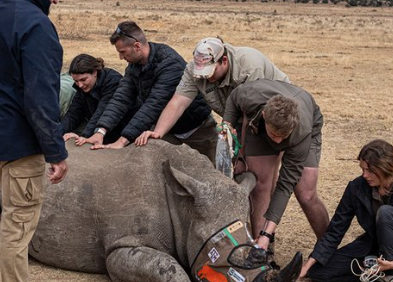These folks are hoping those that eat them will get sick and die? There is another reason as well.
In a groundbreaking effort to deter poachers, researchers in South Africa are implanting radioactive isotopes into the horns of rhinos. This novel approach aims to render the horns useless and potentially harmful for human consumption, addressing a significant driver of poaching.
James Larkin, a professor and dean of science at the University of the Witwatersrand in Johannesburg, explained that the isotopes would make the horn “essentially poisonous for human consumption.” Additionally, the radioactive material would be detectable by global security systems designed to prevent nuclear terrorism, making it challenging for poachers to transport or sell the horns.
Scientists Implant Radioactive Material Into Horn of Living Rhinoceros to Poison Anyone Who Consumes It: https://t.co/uIaFuwvYUp #TechNews #future
— Stream of Tech (@StreamOfTech) June 28, 2024
Larkin reassured that the radioactive chips implanted in the horns pose no health risks to the rhinos or the local environment, presenting an elegant solution to a severe problem. This innovative strategy could significantly impact the illegal trade of rhino horns, which are highly valued in traditional medicine markets, especially in Asia, despite the lack of scientific evidence supporting their medicinal properties.
The demand for rhino horns has led to alarming rates of poaching. In 2023 alone, 499 rhinos were killed, marking an 11 percent increase from the previous year. Although three rhino species remain critically endangered, conservation efforts have helped white rhinos in Africa recover from the brink of extinction. Currently, around 15,000 rhinos are estimated to reside in South Africa.
Scientists in South Africa have developed a revolutionary way to protect rhinos from poaching by injecting radioactive material into their horns. pic.twitter.com/2vorGPjTCU
— Nature World News (@NatureWorldNews) June 28, 2024
Past efforts to protect rhinos from poachers have included poisoning or painting the horns, as well as dehorning them using chainsaws. These methods have had limited success. Vanessa Duthé, a PhD candidate and black rhino conservation specialist at the University of Neuchâtel, noted that dehorning, though criticized, has been one of the quickest and most effective means to safeguard rhinos from poaching.
Larkin and his colleagues are optimistic about the potential of radioactive isotope implants. They plan to start by implanting these isotopes in twenty rhinos. Larkin expressed hope that this innovative method could finally turn the tide against poaching, describing it as “the best idea I’ve ever heard.”
Introducing the groundbreaking Rhisotope Initiative in South Africa, using radioactive rhino horns to combat poaching and protect wildlife for a sustainable future! #RhinoConservation #Innovation https://t.co/rW1iRukjOS
— Sustainable Routes🌍 (@Sustainable07) June 26, 2024
This initiative represents a supposedly promising step forward in wildlife conservation, combining scientific ingenuity with practical application to protect one of the world’s most threatened species. By making rhino horns both dangerous to consume and difficult to trade, this strategy could significantly reduce the incentives for poaching, contributing to the long-term survival of rhinos in the wild. The success of this approach could serve as a model for other conservation efforts, highlighting the importance of innovative solutions in the fight against wildlife crime.
Key Points:
i. Researchers in South Africa are implanting radioactive isotopes into rhino horns to deter poaching by making the horns poisonous for human consumption and detectable by global security systems.
ii. The radioactive chips are safe for the rhinos and the environment, offering an innovative solution to the poaching crisis.
iii. Rhino horns are highly sought after in traditional medicine markets, particularly in Asia, despite no scientific proof of their benefits.
iv. In 2023, 499 rhinos were killed by poachers, an 11% increase from the previous year, highlighting the urgent need for effective conservation measures.
v. Previous methods, including poisoning, painting, and dehorning rhino horns, have had limited success; researchers are hopeful that the new isotope implant strategy will significantly reduce poaching.
Fallon Jacobson – Reprinted with permission of Whatfinger News



